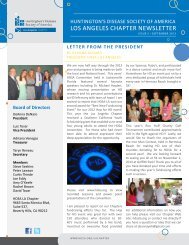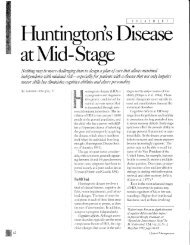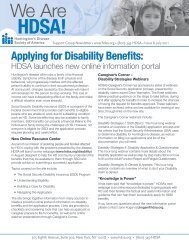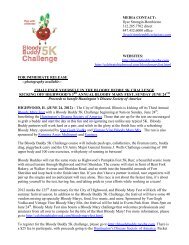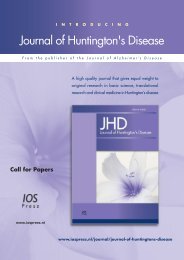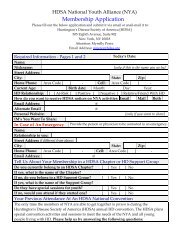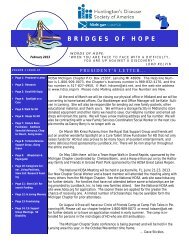Understanding Behavior in HD.final.8-18-05 - Huntington's Disease ...
Understanding Behavior in HD.final.8-18-05 - Huntington's Disease ...
Understanding Behavior in HD.final.8-18-05 - Huntington's Disease ...
You also want an ePaper? Increase the reach of your titles
YUMPU automatically turns print PDFs into web optimized ePapers that Google loves.
7<br />
HOW CAN THE ENVIRONMENT CONTRIBUTE TO BEHAVIOR<br />
DIFFICULTIES IN <strong>HD</strong>?<br />
ROUTINE<br />
S<strong>in</strong>ce the caudate is unable to regulate properly (<strong>in</strong> other words, the gate needs oil), people with <strong>HD</strong> need<br />
a regulated environment that provides daily structure and rout<strong>in</strong>e upon which they can depend. Because the<br />
caudate cannot get the <strong>in</strong>formation from the frontal lobes to decide what is the most important th<strong>in</strong>g to do<br />
next or how to order the day’s activities, a person with <strong>HD</strong> relies on external sources to structure the day and<br />
make decisions.<br />
DISTRACTIONS<br />
When the caudate cannot regulate what is<br />
travell<strong>in</strong>g along the bra<strong>in</strong> circuitry, it becomes<br />
very easy for the circuits to become overloaded.<br />
For <strong>in</strong>stance, if the television and radio are on,<br />
the roommate is talk<strong>in</strong>g on the telephone and a<br />
friend comes <strong>in</strong> and asks whether the person<br />
would like to go outside, the person may respond<br />
with frustration or anger. In this case, the circuits<br />
are overloaded and the caudate is unable to<br />
decide what is important and what is not.<br />
Unfortunately, the friend may not realize that<br />
this environment is too busy—too stimulat<strong>in</strong>g—<br />
and may decide that the person is a grump. A particularly important time to m<strong>in</strong>imize distractions to dim<strong>in</strong>ish<br />
“circuit overload” is dur<strong>in</strong>g mealtime. Swallow<strong>in</strong>g difficulties due to impaired muscle control and function<strong>in</strong>g<br />
create the need for concentration when eat<strong>in</strong>g meals. Distractions while eat<strong>in</strong>g can <strong>in</strong>crease the chances of<br />
chok<strong>in</strong>g and <strong>in</strong>hal<strong>in</strong>g food or liquid <strong>in</strong>to the lungs.<br />
Consider the family who compla<strong>in</strong>ed that they couldn’t get along any more. She reported that he never<br />
listened and couldn’t be relied upon to “do simple household chores like go<strong>in</strong>g to the store.” He stated that<br />
she lost her temper when he forgot one item <strong>in</strong> a list he considered to be too long. After some discussion it<br />
became evident that the caudate gate was not work<strong>in</strong>g properly. As he tried to listen to the store list, several<br />
th<strong>in</strong>gs (such as background noises) competed with his wife’s voice for his limited attention . He described it as<br />
“a wide-open gate—with everyth<strong>in</strong>g rush<strong>in</strong>g <strong>in</strong> at once.” When distractions were m<strong>in</strong>imized and requests were<br />
written <strong>in</strong> short lists, this family got along much better.



